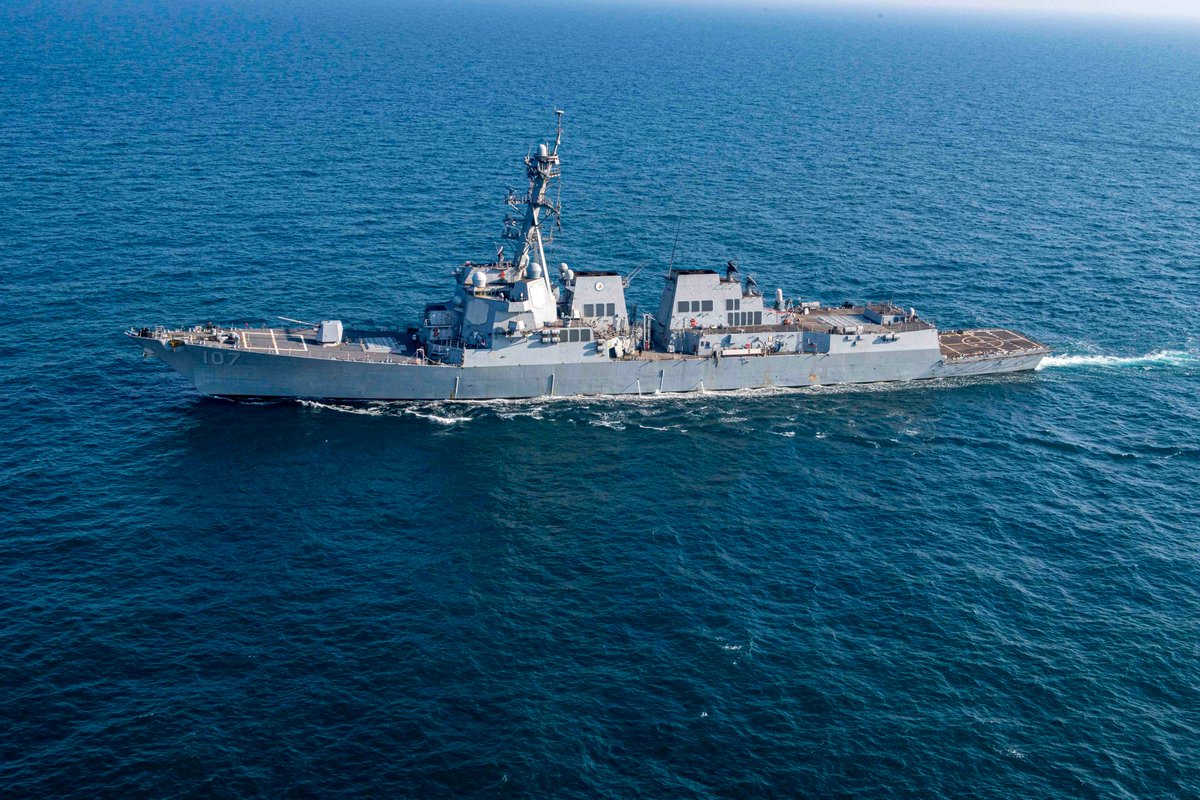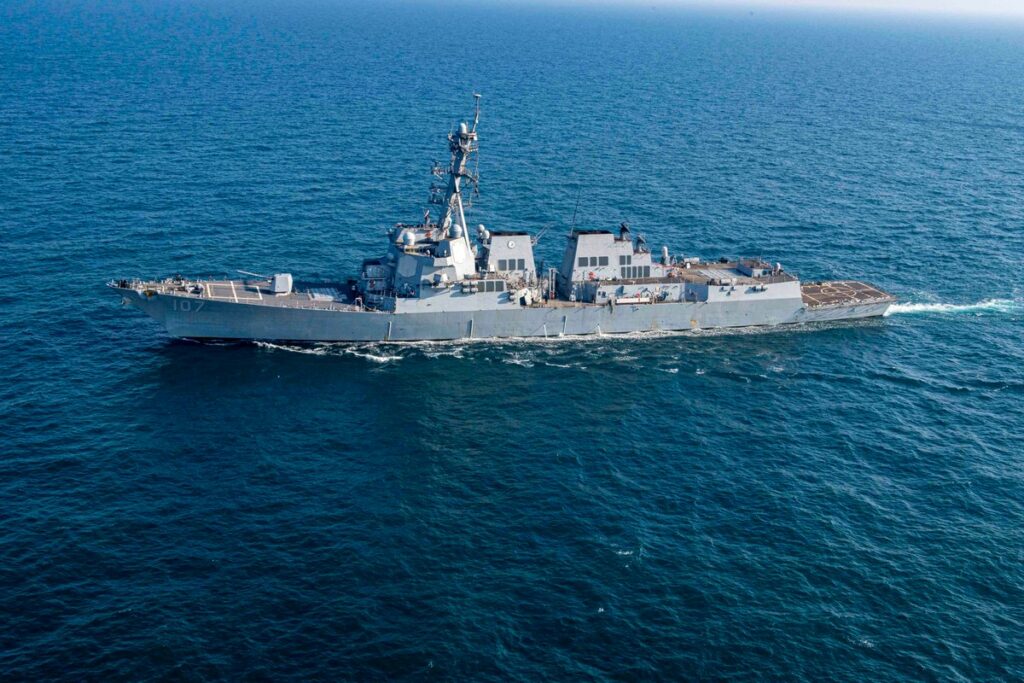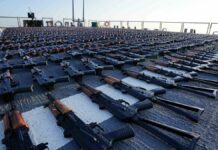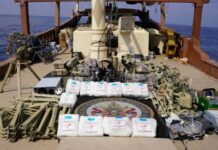
Red Sea situation enters new phase following direct US clash with Houthis
Hans-Uwe Mergener
The first open clash between the patrolling US Navy (USN) and the Yemeni Houthi militia took place on 31 December 2023. USN helicopters despatched in response to a distress call from the container ship Maersk Hangzhou at around 04.30 hrs Central European Time (CET) opened fire in self-defence after being targeted by Houthi militants attempting a hijack using small boats. Three boats were sunk and a fourth fled, while 10 militants were killed, according to Houthi sources.
The Houthi boats had approached the ship, which was en route from Singapore, and fired at it. Attempts to board the container ship, which is registered in Singapore and owned by Copenhagen-based shipping company Maersk, were initially fended off by the security team on board. In response to the call for help from Maersk Hangzhou, helicopters from the aircraft carrier USS Dwight D Eisenhower and the Arleigh Burke-class destroyer USS Gravely took off in support.
Earlier, on the evening of 30 December, Maersk Hangzhou had been hit by a missile fired by the Houthis, although the ship escaped without major damage and the crew remained unharmed. Subsequently, USS Gravely and USS Laboon, another an Arleigh Burke-class destroyer, assisted the Danish container ship. According to US Central Command (CENTCOM), USS Gravely shot down two Houthi missiles.
Maersk Hangzhou displaces around 155,000 tonnes, is 353 m long, and has a capacity of 15,226 twenty-foot equivalent (TEU) containers.
The Houthi attacks in the Red Sea are increasing. According to CENTCOM, the incident on New Year’s Eve is the 24th such attack. The Houthis, who claim to be the Yemeni army, show solidarity with the Palestinians and carry out attacks on merchant ships they suspect of having links to Israel. US naval units have repeatedly intercepted bomb-laden unmanned aerial vehicles (UAVs) and missiles aimed at merchant ships, although until New Year’s Eve US forces had been able to avoid direct confrontation with the Houthis.
In a statement posted online on 31 December 2023 Houthi militia spokesman General Yahya Sarea justified the use of missiles against Maersk Hangzhou because it was “on its way to the ports of occupied Palestine” and the “ship’s crew had refused to respond to warning calls from the Yemeni naval forces”. Gen Sarea reiterated the warning that the Yemeni forces were in favour of “preventing the passage of all Israeli ships or those on their way to the ports of occupied Palestine”. Other shipping traffic, with the exception of Israeli traffic, would remain unhindered and protected, he claimed, while at the same time warning against engaging in “dangerous American behaviour”. The statement read: “The Yemeni armed forces renew their advice to all countries not to be drawn into the American plans aimed at igniting the conflict in the Red Sea and that they will not hesitate to confront any aggression against our country and our people.

Attack in response to a Danish deployment?
Regardless of whether Maersk Hangzhou can actually be linked to support for Israel, the repeated attacks on the container ship could be seen as a reaction to the Danish declaration of participation in the Red Sea shipping protection operation launched by the Pentagon; the Danish government’s decision to send a frigate to the region was published on 29 December. According to the press release, a bill will be submitted to the Danish parliament in January “to contribute to OPG [Operation ‘Prosperity Guardian’] with a frigate that can be deployed from the end of January”. Denmark currently has three staff officers at the headquarters of the multi-national Combined Maritime Forces, one of whom is assigned to Operation ‘Prosperity Guardian’.
In addition to the United States, Bahrain, France, Italy, Canada, the Netherlands, Norway, the Seychelles, Spain and the United Kingdom have showed a willingness to get involved.
Hesitant EU states
In a joint statement on 19 December the actions of the Houthis against international merchant shipping in the Red Sea were condemned by the “governments of the United States of America, High Representative Josep Borrell on behalf of the European Union, Secretary General Jens Stoltenberg on behalf of NATO and a group of 44 allies and partner nations”. These include Australia, the Bahamas, Japan, Liberia, New Zealand, South Korea, Singapore, the United States and, remarkably, Yemen, which remains a divided country.
So far, Denmark is one of the few EU countries wanting to participate in Operation ‘Prosperity Guardian’ by sending a ship. This seems plausible in view of the fact that Danish company Maersk is the world’s second-largest container shipping company. Germany, meanwhile, as the third-largest trading nation, has been examining the possibility of participating, although even a Houthi attack on a vessel owned by German container shipping company Hapag Lloyd did not hasten any German decision on this.
In contrast, Paris, Rome, The Hague and Madrid quickly agreed to deploy naval assets, though not under the command of Operation ‘Prosperity Guardian’. France and the United Kingdom each already have a frigate deployed in the Red Sea region, while Italy has announced the deployment of the frigate Virginio Fasan, which is being deployed sooner than expected and was due to pass through the Suez Canal on 24 December.
However, unlike France, the United Kingdom and the United States, the countries that agree to participate in Operation ‘Prosperity Guardian’ must have such deployments mandated, which requires preparation.
Another point is that not all European capitals want to integrate their naval vessels into US command structures. France traditionally commands its units nationally, Italy wants to keep its frigate under national command, while Spain holds out the prospect of the participation of a ship if the operation is carried out under a NATO or EU ‘mandate’.
The wider dimension
For the European states the differences in dealing with the Gaza conflict as well as the criticism of Israel’s actions are putting a strain on efforts to find a joint response, including one regarding the protection of merchant shipping in the Red Sea.
This means that the Houthis have probably already achieved one of their war aims, since the disagreement over how to proceed is more detrimental to maritime security than the benefits of the announced operation to protect it.
Moreover, as Politico stated, “The war [in Gaza] is increasingly driving a wedge between Western powers, as EU leaders grapple with increasingly hostile public opinion towards Israel over the rising death toll, while Iran’s proxies step up the stakes.”
Ultimately, it should become clearer to European capitals that a mission to protect merchant shipping in the Red Sea against the Houthi threat has greater implications than simply fighting a militia in small combat boats and defending against approaching missiles. The question of the appropriate means of defence and the proportionality of its costs so far (in terms of missiles expended etc) will be difficult to answer over the short term. This means that disproportionately expensive SM-2 air defence missiles or similar weapons will probably continue to be fired at low-value aerial targets like bomb-laden UAVs.
Looking more at the strategic level, Iran has renewed its support for the Houthis, condemned the US intervention in the Red Sea and, according to consistent press reports, ordered a naval unit into the region. On 1 January 2024 the Iranian Alvand-class frigate Alborz passed through the Bab-el-Mandeb strait. Iranian Defence Minister Mohammad-Reza Gharaei Ashtiani was quoted in the British media as saying, “No one can do anything in a region where we have supremacy.” This means that the Western confrontation with the Houthis will not be limited to them alone.
Meanwhile, it remains to be seen when the Houthis will change their previous behaviour and take offensive action against US Navy and possibly also coalition units. The incident in relation to Maersk Hangzhou on 31 December could be a turning point.












